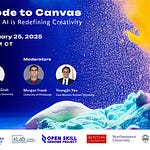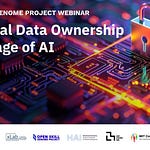Speakers:
Kerri Lemoie, PhD, Director, Digital Credentials Consortium (DCC) at MIT
Mark McConahay, Senior Consultant and Innovative Credential Coordinator, AACRAO Consulting
Rob Coyle, Technical Program Manager for Digital Credentials, 1EdTech
Youngjin Yoo, Elizabeth M. and William C. Treuhaft Professor in Entrepreneurship, Weatherhead School of Management, Case Western Reserve University | Faculty Co-director, xLab
On April 22, 2025, our team at Open Skill Genome Project—a collaboration between xLab at Case Western Reserve University, the University of Pittsburgh, and the Digital Credentials Consortium (DCC) at MIT, with support from the Walmart Foundation—hosted a webinar focused on building a trusted, equitable Learning and Employment Record (LER) ecosystem, in partnership with the LER Accelerator Initiative. As part of our research mission to develop open, verifiable credential systems powered by artificial intelligence, we also share leading-edge thinking on the future of digital credentials infrastructure. This session explored how LERs can evolve to serve learners better while transforming education and the labor market.
Dr. Youngjin Yoo opened the session by introducing xLab, an interdisciplinary research center at Case Western Reserve University focused on helping legacy companies modernize through emerging digital technologies. Open Skill Genome Project applies blockchain, decentralized technology, and AI to create equitable credential systems that give learners ownership over their achievements. By using AI to infer skills from diverse learning experiences and designing systems that prioritize individual agency, the project aims to build a fairer, more efficient labor market. With this context, the panel turned to a deeper discussion on how Learning and Employment Records (LERs) are evolving to meet these goals.
Dr. Kerri Lemoie, Director of the Digital Credentials Consortium at MIT, moderated the session. She led a dynamic discussion with two credentialing leaders: Mark McConahay of AACRAO and Rob Coyle of 1EdTech. Together, they unpacked how traditional academic records are giving way to digital, portable credentials that empower individuals. Their conversation spanned the technical, institutional, and human sides of creating verifiable, privacy-respecting credential ecosystems.
Understanding the Evolution of Credentials
Mark McConahay offered a historical lens, showing how the traditional academic transcript, largely unchanged since the 1800s, no longer fits the needs of today’s learners or employers. He walked participants through a continuum, tracing the journey from paper diplomas to PDF transcripts to digitally signed, machine-readable credentials. He emphasized that while higher education has been slow to change, the need for trustworthy, agency-driven credentials is urgent in a skills-based economy.
Rob Coyle added the technical perspective, describing how standards like Open Badges 3.0 and Comprehensive Learner Records (CLR) 2.0 are paving the way for interoperable, verifiable records. He explained that the goal isn’t to erase the traditional transcript, but to give learners new tools that better represent their evolving skills and experiences in real-time.
Core Challenges and Opportunities
The panel surfaced some major challenges the field must address:
Language confusion: Different terms like badges, LERs, CLRs, and digital credentials cause unnecessary complexity. Building shared vocabulary is essential.
Institutional inertia: Shifting to richer credentialing demands changes in pedagogy, assessment, and governance, which are often seen as too resource-intensive.
Perceived technical barriers: While solutions exist, many institutions overestimate the technical difficulty of adopting new credential formats.
At the same time, they identified clear opportunities:
Using AI to enhance traditional records: AI can infer skills and competencies from existing transcripts and syllabi, helping bridge old systems into new digital ecosystems.
Strengthening learner agency: By moving to wallet-based, privacy-preserving verifiable credentials, institutions can finally put learners in control of their own achievements.
Cross-institution collaboration: LER success demands that registrars, technologists, faculty, and employers all align their efforts around open standards.
LERs and the Future of the Labor Market
The conversation connected back to the Open Skill Genome Project’s broader goals. Dr. Youngjin Yoo closed the session by emphasizing that while technologies like AI, blockchain, and verifiable credentials won’t exactly deliver on every early promise, they will absolutely reshape education and work in ways that matter. The key is to steer that transformation thoughtfully, ensuring the new digital economy benefits more people, not just a few.











Share this post